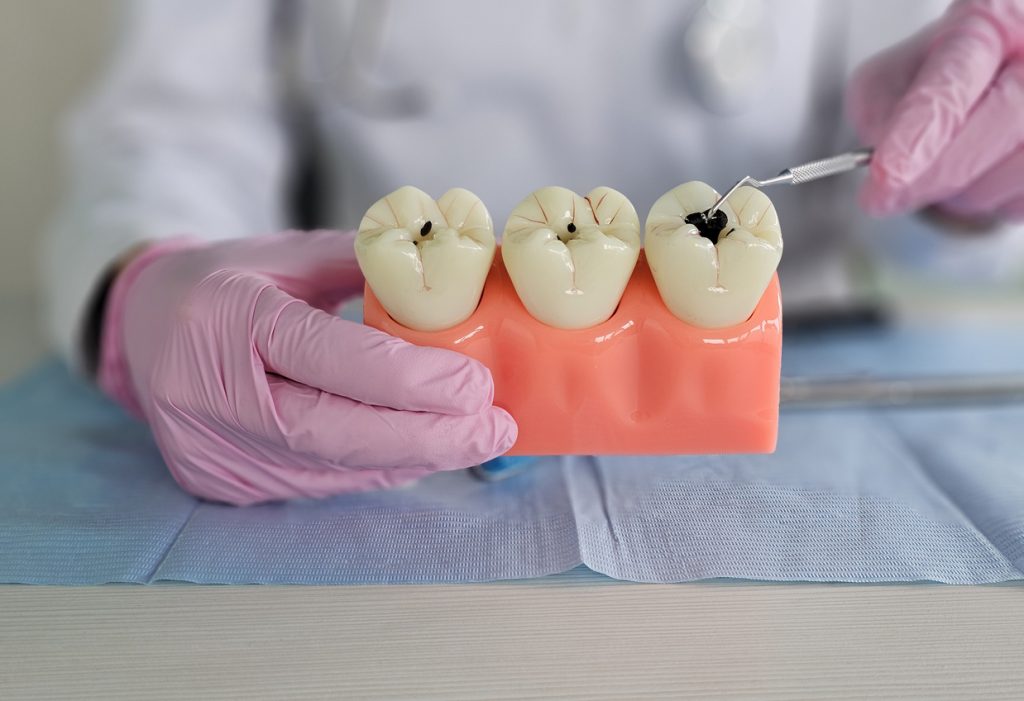How Diet has a Large Effect on Tooth Decay
Diet is your most powerful tool when trying to prevent tooth decay. Whenever we eat or drink unhealthy food and beverages, especially things high in sugar or acidity, it creates the right environment for bacteria to thrive. These bacteria feed on carbohydrates, especially sugars, and attack the enamel of your teeth. When this happens repeatedly, the enamel can break away completely, exposing the sensitive inner layers of your teeth and causing a cavity. To reduce this risk, it’s best to limit sugary and acidic foods. Keep sweet desserts to a minimum and brush your teeth afterwards to help clear away the harmful bacteria before it can feed on the sugar and multiply.
Smart Snacking for Better Oral Health
We tend to snack frequently rather than have just three set meals each day. Snack foods are delicious, but they could be doing more harm than good to your oral health. Breaks between food is important to allow your saliva to build up and do what it’s meant to. Saliva helps keep your mouth at the correct pH, not allowing those harmful bacteria to grow. It also contains the minerals your teeth need so it can help remineralise damaged enamel, helping combat the early stages of tooth decay. When we constantly snack though, our saliva is swallowed more often so it can’t work its magic.
To maintain better oral health while snacking:
- Snack at set times during the day and only eat if you’re hungry
- Choose healthier options like vegetable sticks or nuts to keep your mouth pH more balanced
- Chew sugar-free gum after snacking (preferably containing xylitol) to boost saliva and neutralise acid
- Drink water to help clear food particles which can build up and cause plaque
Speaking of water, it’s important to consider what beverages you’re consuming. Many people focus on their food and forget about their sugary fruit juices, energy drinks, or coffees with flavoured syrups. You can of course have these things as a treat, but they will increase the acidity in your mouth to let those bacteria breed so make sure you’re not consuming them constantly through the day. Swapping most of your drinks to water won’t disrupt your mouth’s natural environment or saliva production.
The Importance of Regular Dental Appointments and When to Consider Sealants
Changing your diet is a great first step but another powerful tool is seeing your dentist regularly. They will be able to spot early signs of tooth decay and offer advice and treatments to help before it worsens. They’ll assess your individual risk for tooth decay and help you make the necessary changes to combat that risk. Detecting dental issues early through regular appointments also means less invasive treatments are needed to correct them saving you the cost and discomfort of more complex procedures.
Professional Cleanings & Fluoride
Regular cleanings are recommended too, typically every 6 months but your dental team will advise the best schedule based on your oral health. Even the best brusher and flosser won’t be able to get all the plaque off their teeth each time they clean, and the leftover plaque hardens into tartar which can cause decay and other oral problems like gum disease. Your dental team will use specialised equipment to remove this tartar during professional cleanings before it can cause these problems. The dental cleaning team will also likely observe your brushing technique and help you make adjustments for more effective cleaning or recommend extra products to help such as a water flosser. The better your oral hygiene routine, the less likely you are to develop tooth decay. Taking your child for cleanings can also help provide them with a good cleaning routine from the start and ensure they have a good relationship with their dental team so they’ll continue coming to regular appointments as an adult.
Regularly using fluoride, which is in nearly all tap water in Australia as well as many brands of toothpastes and mouthwashes, has been shown in many studies to reduce the number of cavities. This is because it helps to remineralise enamel and reduce the bacteria we mentioned earlier. When you next stock up on toothpaste make sure you haven’t accidentally picked up fluoride free.
Consider Dental Sealants
Finally, speak to your dentist about sealants. These are similar to fillings but without any drilling so there’s no pain. A thin coating is placed onto molars to create a smooth surface instead of the usual bumps and ridges. This means the teeth are easier to clean and it helps avoid any food particles becoming trapped and leading to decay. They’re typically used for children, and can be placed as soon as their permanent teeth come through, but if you’re at risk of cavities as a teenager or adult they can be an option.
At Dental @ Niddrie, we pride ourselves on providing an incredible patient experience from our multilingual team to our affordable prices. We’ll work with you to help you prevent tooth decay and keep great oral hygiene. Find out more about our unique approach to dentistry here.




